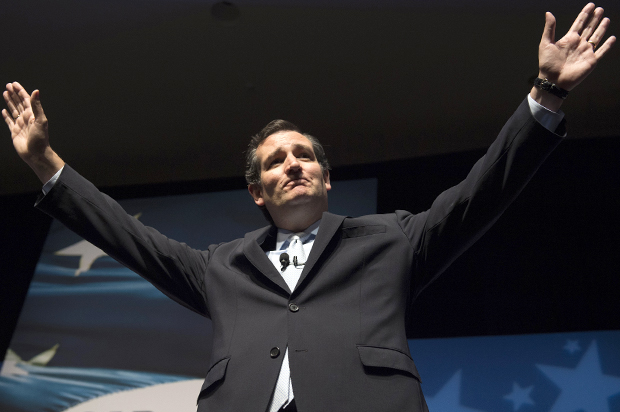Less than two years after he galvanized conservatives by shutting down the federal government in a bid to derail health care reform, Tea Party firebrand Sen. Ted Cruz (R-TX) became the first major candidate late Sunday night to formally declare a 2016 presidential bid.
Hours before he was set to announce his intentions at the Jerry Falwell-founded Liberty University on Monday, Cruz posted an announcement video on Twitter, where he confirmed that he will seek the White House next year.
[embedtweet id=579857596191899648]
“It’s a time for truth, a time to rise to the challenge, just as Americans have always done. I believe in America and her people, and I believe we can stand up and restore our promise,” Cruz says in the video. “It’s going to take a new generation of courageous conservatives to help make America great again, and I’m ready to stand with you to lead the fight.”
Elected to the Senate in 2012, Cruz, 44, landed his first major political role as a policy adviser to George W. Bush’s 2000 presidential campaign, where he met his now-wife, Heidi. After Bush’s ascension to the presidency, Cruz took jobs working in the Justice Department and at the Federal Trade Commission. Eager to seek political office himself someday, the Harvard-educated lawyer pounced at the chance to return to his home state of Texas in 2003, when then-Attorney General Greg Abbott appointed Cruz solicitor general of the state. The position afforded Cruz the opportunity to argue cases before the U.S. Supreme Court.
Few gave Cruz much chance of success when he launched his U.S. Senate candidacy, given that he was running against Lt. Gov. David Dewhurst, a tribune of the Texas GOP establishment. But depicting him as a squishy Republican In Name Only, Cruz dispatched Dewhurst after forcing him into a runoff, taking 57 percent of the vote to Dewhurst’s 43 percent.
Not one to adhere to the unspoken rule that freshman senators may be seen but should be rarely heard, Cruz made a splash with his 2013 arrival in Washington, railing against a Republican leadership he argued was far too accommodating to the Obama administration on issues ranging from immigration to health care reform. (That the GOP has offered virtually unanimous opposition to the administration’s policies on such issues hasn’t placated Cruz, who favors scorched-earth tactics to stop the White House’s policy agenda.)
After leading the government shutdown in the fall of 2013 — when Cruz unsuccessfully attempted to cut off funding to the Affordable Care Act — he vaulted to the top of polls for the GOP’s 2016 presidential nomination. Plagued by establishment doubts about his electability and falling victim to the Tea Party’s tendency to abruptly discard last month’s fling for a hot new prospect, however, Cruz has gradually declined since. RealClearPolitics’ polling average finds the senator in 8th place in a crowded GOP field, claiming less than five percent support. By announcing his 2016 plans early, Cruz aims to recapture the right-wing attention and energy that propelled his rapid rise.

